In the ever-evolving landscape of kitchen appliance manufacturing, the integration of Artificial Intelligence (AI) has sparked a revolution in quality control. This shift is reshaping the European and American markets, bringing forth unprecedented levels of efficiency, accuracy, and cost reduction. As we delve into the intricacies of this transformation, it becomes evident that the role of AI in enhancing quality control is not just a fleeting trend but a cornerstone of the future of kitchen appliances.
1 The Evolution of Quality Control in Kitchen Appliances
The evolution of quality control in the kitchen appliance industry has been a journey marked by continuous innovation and adaptation. From the early days of manual inspections to the sophisticated AI-driven systems of today, the industry has made significant strides in ensuring that every product meets the highest standards of excellence.
In the early stages, quality control relied heavily on the eyes and hands of skilled workers. These individuals meticulously checked each appliance for defects, ensuring that every product that left the factory was free from imperfections. This process, while labor-intensive, was necessary due to the lack of advanced technologies that could automate these tasks.
The introduction of automated quality control systems in the mid-20th century marked a significant shift. Machines began to take over repetitive tasks, reducing the potential for human error and increasing efficiency. These early systems were often basic, employing sensors to detect surface imperfections on metal appliances or minor discrepancies in plastic parts.
As technology advanced, so did the capabilities of quality control systems. The integration of computer vision allowed for more sophisticated inspections, enabling machines to identify and categorize defects with greater precision. This shift from mechanical to optical inspection methods meant that even the smallest flaws could be detected, leading to a substantial increase in product quality.
The advent of the Internet of Things (IoT) has further revolutionized quality control in the kitchen appliance industry. With appliances becoming smarter, they can now communicate with each other and with central systems, providing real-time data on performance and potential issues. This data-driven approach to quality control allows for predictive maintenance, where potential problems are identified before they lead to defects.
In the realm of smart kitchen appliances, AI has taken quality control to new heights. AI-driven systems can analyze vast amounts of data to identify patterns and trends that might indicate quality issues. These systems can learn from each production cycle, improving their algorithms over time to become more efficient and effective.
For instance, AI can be used to analyze the sounds that a kitchen appliance makes during operation, identifying any unusual noises that could indicate a problem. By processing the sounds through sophisticated algorithms, AI can predict the likelihood of a malfunction, potentially saving the manufacturer from costly recalls and repairs.
Furthermore, AI can optimize the manufacturing process itself. By analyzing data from the production line, AI can adjust machine parameters to prevent defects. This real-time adjustment can lead to a significant reduction in waste and an increase in the overall yield of high-quality products.
The shift to AI-driven quality control also brings with it the opportunity for customization. In the past, appliances were standardized to reduce the risk of defects. Now, AI can monitor individual units, ensuring that each one meets the exact specifications for its intended use, whether that’s a commercial kitchen or a residential setting.
However, the evolution of quality control in the kitchen appliance industry is not without challenges. There are concerns about the cost of implementing AI systems, as well as the need for skilled workers who can operate and maintain these advanced systems. There’s also the ethical consideration of job displacement and the potential for AI to be misused.
Despite these challenges, the evolution of quality control in the kitchen appliance industry is a testament to human ingenuity and the relentless pursuit of perfection. As technology continues to advance, the industry is poised to see even more innovative solutions that will elevate the quality and reliability of kitchen appliances worldwide.
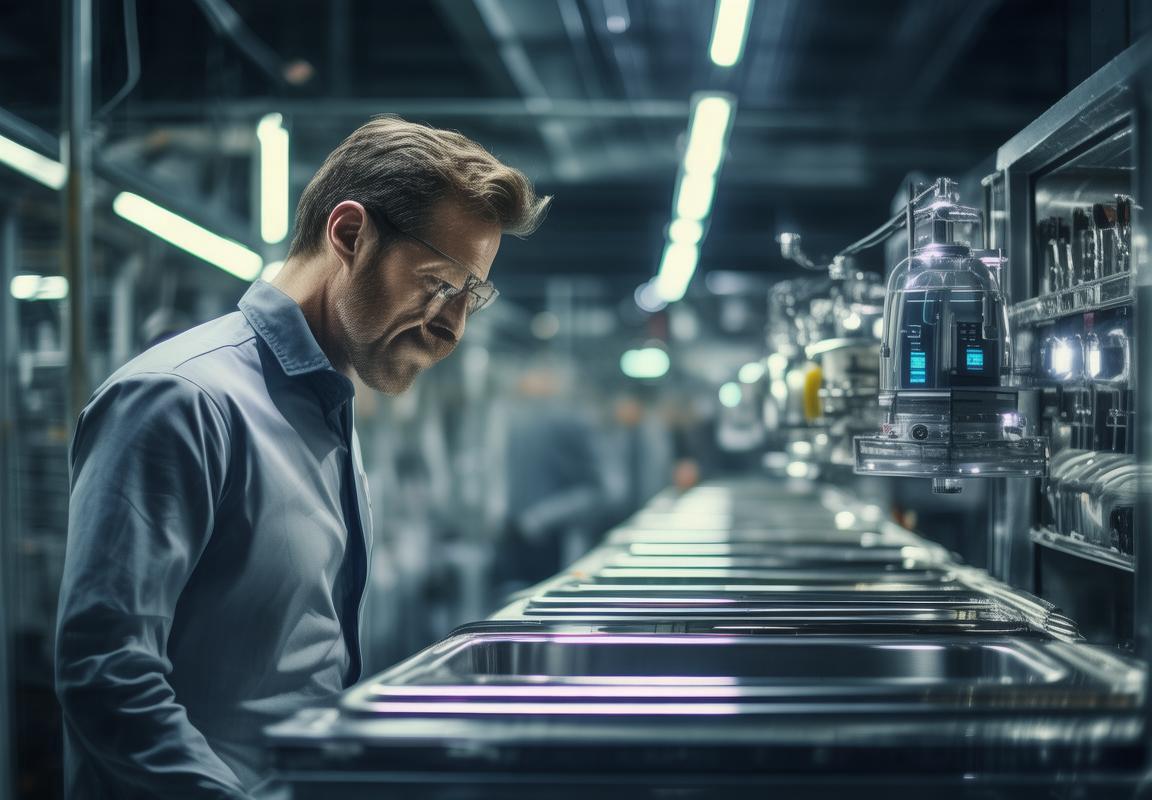
The AI-Driven Revolution in Quality Assurance
The kitchen appliance industry has long relied on meticulous quality control processes to ensure that products meet the highest standards. Over the years, these methods have evolved, from simple visual inspections to complex automated systems. Now, the advent of artificial intelligence (AI) has sparked a revolution in quality assurance, transforming how manufacturers ensure the reliability and performance of their products.
AI has introduced a new level of sophistication to quality control, leveraging advanced algorithms and machine learning to analyze and optimize processes. This transformation is marked by several key developments:
-
Predictive MaintenanceAI-driven systems can now predict potential malfunctions before they occur, using data collected from sensors within kitchen appliances. By analyzing patterns and trends, these systems can alert manufacturers to impending issues, allowing for preemptive maintenance and preventing costly breakdowns.
-
Real-Time MonitoringWith AI, manufacturers can monitor the production line in real-time, detecting deviations from standard procedures or identifying anomalies that could compromise quality. This constant oversight ensures that any issues are caught early, reducing the likelihood of defective products reaching the consumer.
-
Improved Defect DetectionTraditional quality control methods often rely on human inspectors, who can be prone to fatigue and inconsistency. AI, on the other hand, can perform flawlessly repetitive tasks with unparalleled precision. It can inspect components for defects with a level of detail that surpasses the human eye, identifying minute imperfections that might go unnoticed.
-
Customized Quality ControlAI systems can be tailored to specific product requirements, learning from historical data and adapting to the unique characteristics of each appliance. This customization allows for a more nuanced approach to quality control, ensuring that each product meets the exacting standards set by the manufacturer.
-
Data-Driven Decision MakingThe vast amounts of data generated by AI systems provide valuable insights for decision-making. Manufacturers can use this data to optimize production processes, reduce waste, and improve efficiency. It also enables a deeper understanding of consumer preferences, leading to better product design and innovation.
-
Enhanced CollaborationAI-driven quality control systems facilitate better collaboration between different departments within a manufacturing facility. For example, production teams can work more closely with engineers and designers to address issues quickly and effectively, ensuring that quality is maintained throughout the production cycle.
-
Regulatory ComplianceIn an industry that is heavily regulated, AI can help manufacturers stay compliant with various standards and certifications. By ensuring that products meet these requirements, AI-driven quality control can reduce the risk of legal issues and fines.
-
ScalabilityAs the kitchen appliance market continues to grow and diversify, AI systems can scale to accommodate the increased demand. This scalability is crucial for manufacturers looking to expand their product lines or enter new markets without compromising on quality.
-
Consumer TrustUltimately, the implementation of AI-driven quality control can enhance consumer trust. By producing consistently high-quality products, manufacturers can build a reputation for reliability, which is essential in a competitive market.
-
Continuous LearningAI systems are not static; they continuously learn and improve. As they encounter new data and scenarios, they refine their algorithms, becoming more adept at identifying and addressing quality issues. This continuous learning ensures that quality control remains effective and up-to-date with the latest manufacturing challenges.
The AI-driven revolution in quality assurance is not just a technological advancement; it’s a fundamental shift in how the kitchen appliance industry approaches product reliability and customer satisfaction. As AI continues to evolve, its role in quality control will only grow, setting new benchmarks for excellence in the industry.
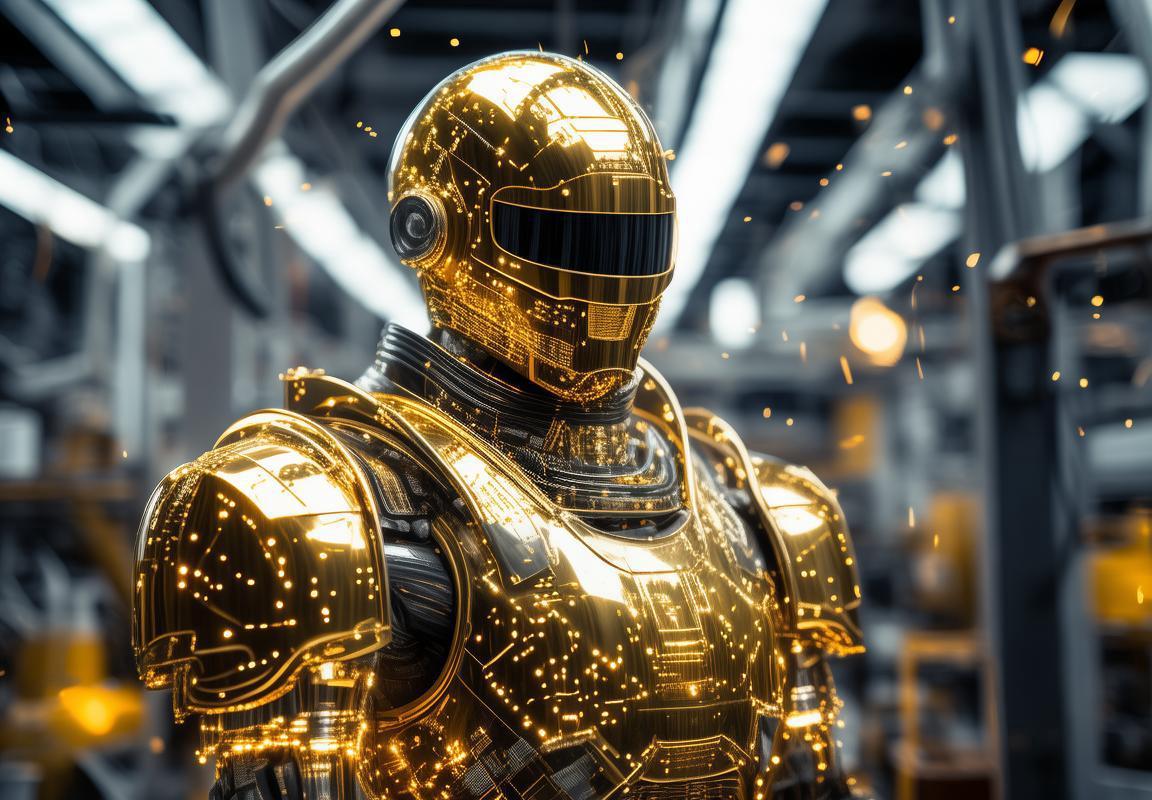
1 Introduction to AI-Driven Production Quality Control
In the ever-evolving landscape of kitchen appliance manufacturing, the advent of AI-driven production quality control has marked a significant turning point. This transformation leverages advanced technologies to ensure that every product leaving the factory floor meets the highest standards of quality. Let’s delve into the nuances of this revolutionary approach.
The integration of artificial intelligence into quality assurance processes has been a gradual but transformative journey. Initially, quality control relied heavily on manual inspection and human oversight. Skilled workers meticulously examined each unit for defects, a process that was time-consuming, prone to human error, and limited in its ability to handle complex issues.
With the rise of AI, the landscape of quality control has shifted dramatically. AI-driven systems are now capable of analyzing vast amounts of data in real-time, making them far more efficient than their human counterparts. These systems are designed to recognize patterns, predict potential defects, and offer solutions before they become a problem.
One of the core components of AI-driven quality control is machine learning. This technology allows the systems to continuously improve over time, learning from each inspection to become more accurate. By processing data from thousands of products, AI systems can identify even the most subtle defects that might otherwise go unnoticed.
Another key aspect is the use of computer vision. Modern AI systems are equipped with high-resolution cameras that can capture detailed images of every component. These images are then analyzed by AI algorithms, which can detect anomalies that may indicate a defect. This level of detail and speed far surpasses what human inspectors can achieve.
In addition to visual inspection, AI-driven quality control systems can also analyze performance metrics. For instance, smart sensors embedded in appliances can provide data on how the unit operates under various conditions. AI algorithms can then use this data to predict the longevity and reliability of the product, ensuring that it meets the manufacturer’s standards.
The benefits of AI-driven production quality control are multifaceted. For starters, the accuracy of these systems is unparalleled. Defect rates are significantly reduced, leading to higher customer satisfaction and brand reputation. Moreover, the speed at which AI systems operate means that production lines can run more smoothly, with less downtime for quality checks.
Cost savings are also a major advantage. While the initial investment in AI technology can be substantial, the long-term benefits are substantial. By minimizing defects, companies can reduce the number of products that need to be recalled or repaired, saving money on warranty claims and customer service. Additionally, the efficiency of AI systems can lead to lower labor costs, as fewer human inspectors are needed.
In terms of environmental impact, AI-driven quality control can also play a significant role. By reducing waste and the need for excess packaging, companies can contribute to a more sustainable manufacturing process. The precision of AI systems ensures that only products that meet strict quality standards are released, reducing the environmental footprint of kitchen appliances.
However, the transition to AI-driven quality control is not without its challenges. There are concerns about data security and privacy, especially as these systems require access to sensitive information. Companies must ensure that they have robust cybersecurity measures in place to protect this data.
Furthermore, the integration of AI into existing production lines can be complex. It requires careful planning and coordination to ensure that the systems are seamlessly integrated without disrupting the workflow. Training employees to work alongside AI systems is also crucial, as the technology can change the nature of certain jobs.
Despite these challenges, the shift towards AI-driven production quality control is a testament to the power of technology in transforming industries. As these systems continue to evolve and become more sophisticated, they are poised to revolutionize the way kitchen appliances are made, ensuring that quality is not just a buzzword but a cornerstone of the manufacturing process.
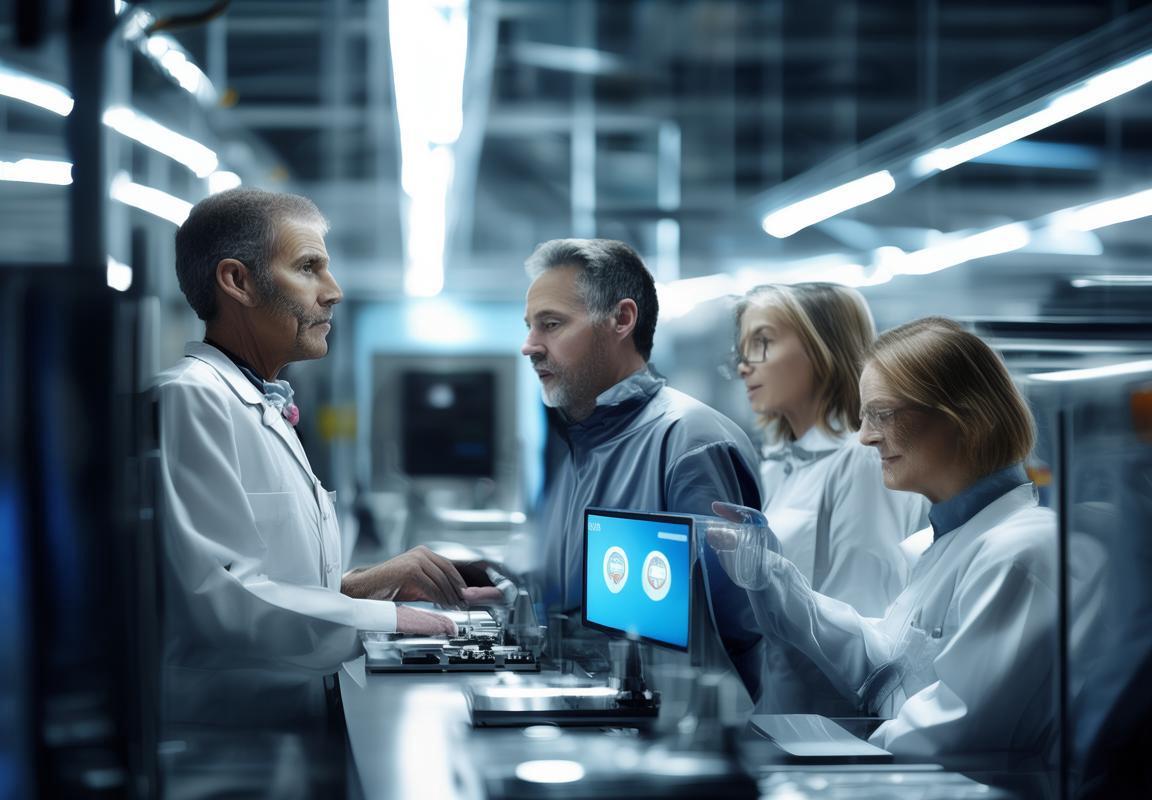
2 How AI Enhances Quality Control
AI’s role in quality control has revolutionized the kitchen appliance industry, introducing a new era of precision and efficiency. Here’s how AI is transforming the landscape:
Data Analysis and Pattern RecognitionAI excels at analyzing vast amounts of data to identify patterns that might go unnoticed by the human eye. In kitchen appliance manufacturing, this means that AI can detect minute anomalies in components that could lead to faulty appliances. By continuously learning from historical data and real-time production information, AI algorithms can predict potential issues before they escalate, ensuring a higher quality output.
Predictive MaintenanceWith AI’s ability to analyze data and recognize patterns, predictive maintenance becomes a reality. By monitoring the performance of appliances throughout their lifecycle, AI can forecast when maintenance is needed, reducing downtime and preventing catastrophic failures. This proactive approach not only extends the lifespan of appliances but also minimizes the risk of defects reaching the consumer.
Automated InspectionsTraditional quality control often relies on manual inspections, which can be time-consuming and prone to human error. AI-driven systems, on the other hand, can perform automated inspections at a much faster pace and with unparalleled consistency. These systems use machine vision and other sensors to scan components for defects, cracks, or irregularities, ensuring that only appliances that meet the highest standards are released for use.
Real-Time FeedbackAI can provide real-time feedback on the manufacturing process, allowing for immediate adjustments to correct errors or inconsistencies. This level of oversight is crucial in maintaining the quality of the final product, as it allows for the correction of issues before they become systemic problems that affect a large number of units.
Customization and PersonalizationIn the kitchen appliance industry, customization is key. AI enables the creation of highly personalized products by analyzing consumer data and preferences. This not only enhances customer satisfaction but also allows for quality control to be tailored to specific requirements, ensuring that each appliance is designed and built to meet individual standards.
Quality Control ProtocolsAI-driven systems can establish and enforce rigorous quality control protocols. These protocols are not static but can evolve based on new data and insights. By continuously learning and adapting, AI can optimize the quality control process, making it more robust and effective over time.
Enhanced TraceabilityWith AI, the traceability of products throughout the supply chain is greatly improved. Every step of the manufacturing process can be documented and analyzed, providing a clear audit trail. This not only ensures that any quality issues can be quickly identified and addressed but also builds trust with consumers who value transparency in the products they purchase.
ScalabilityThe scalability of AI-driven quality control is another significant advantage. As the demand for kitchen appliances grows, AI systems can handle the increased volume without compromising on the quality of the inspections. This scalability is essential for companies looking to expand their operations while maintaining the highest standards.
Integration with IoTThe integration of AI with the Internet of Things (IoT) further enhances quality control. By connecting appliances to a network, manufacturers can collect real-world usage data, which can then be used to improve design, functionality, and quality. This interconnectedness allows for a seamless flow of information that can drive continuous improvement.
Employee Training and SupportAI doesn’t replace human workers; it complements them. By providing employees with real-time data and insights, AI can assist in training and support, ensuring that every worker is equipped with the knowledge and tools needed to maintain high-quality standards.
In summary, AI-driven production quality control is reshaping the kitchen appliance industry by providing advanced tools and systems that not only enhance the quality of the products but also improve efficiency, reduce costs, and provide a better end-user experience. As the technology continues to evolve, its impact on quality assurance is poised to grow even more significant.
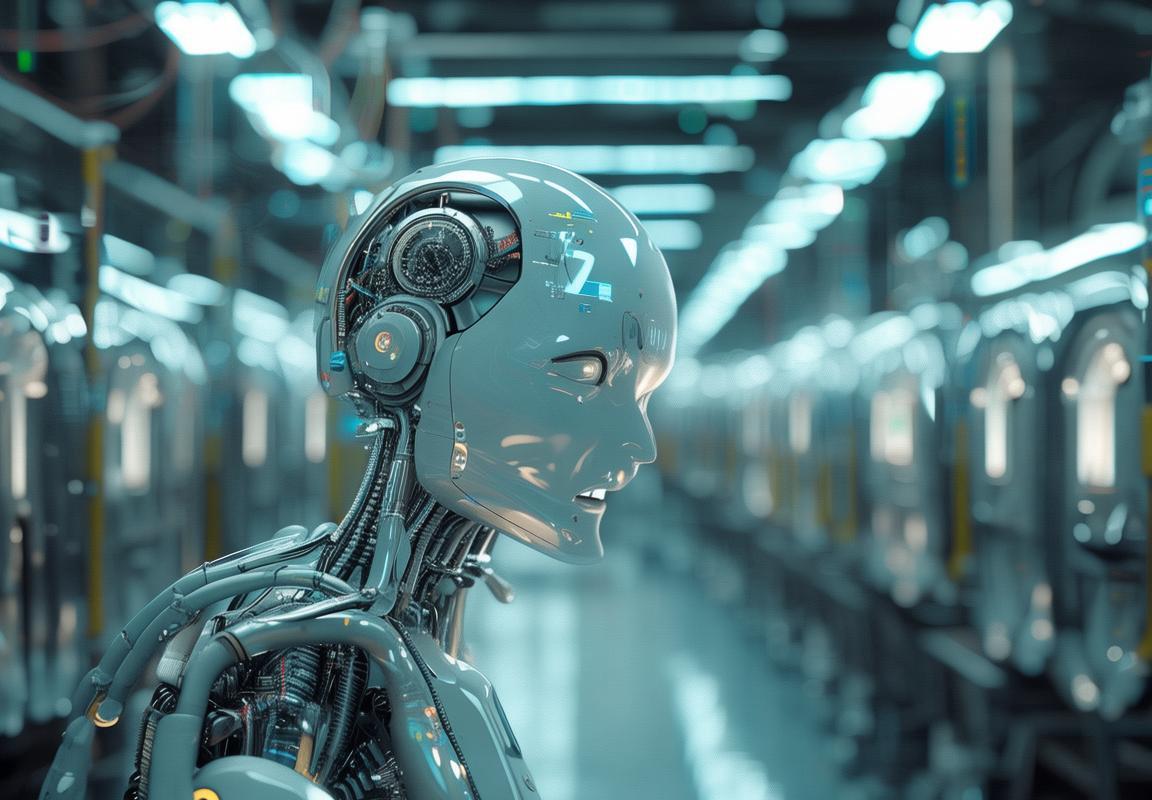
The Impact of AI on the European and American Kitchen Appliance Markets
In the kitchen appliance industry, AI’s influence is reshaping the landscape of quality control in Europe and America. This transformation is marked by several key impacts:
-
Precision in Manufacturing: AI systems, equipped with advanced machine learning algorithms, can analyze intricate patterns and identify even the most subtle defects in appliances. This precision is unparalleled by traditional quality control methods, leading to a higher standard of product consistency and reliability across the board.
-
Real-Time Monitoring: AI-driven quality control systems can monitor production lines in real-time, detecting issues as they arise. This immediate feedback loop allows for quick corrective actions, minimizing downtime and reducing the risk of defective products reaching the market.
-
Customization and Personalization: The European and American markets are known for their demand for customized and personalized products. AI enables manufacturers to tailor their appliances to individual preferences, ensuring that each unit meets the specific needs of its intended user. This level of customization was previously unattainable without significant manual intervention.
-
Data-Driven Decision Making: AI’s ability to process and analyze vast amounts of data has revolutionized the decision-making process in quality control. By identifying trends and patterns that may not be immediately apparent, manufacturers can make informed decisions about design improvements, supply chain management, and even marketing strategies.
-
Increased Efficiency: Automation of quality control processes through AI has significantly boosted efficiency. Routine checks and inspections that once required hours of manual labor can now be completed in seconds, freeing up human resources for more complex tasks and fostering innovation.
-
Environmental Impact: AI-driven quality control can also have a positive environmental impact. By reducing waste through more accurate defect detection and optimizing production processes, the industry can lower its carbon footprint. This is particularly relevant in regions like Europe, where sustainability is a high priority.
-
Consumer Trust: The integration of AI in quality control has bolstered consumer trust in kitchen appliances. As products become more reliable and consistent, consumers are more likely to invest in higher-end models, leading to increased sales and market share for companies that adopt AI technologies.
-
Competitive Edge: In the fiercely competitive European and American markets, the adoption of AI-driven quality control gives companies a significant edge. It allows them to innovate faster, meet stringent safety and quality standards, and stay ahead of the curve in a rapidly evolving industry.
-
Global Collaboration: The implementation of AI in quality control has also facilitated global collaboration. Companies can now share data and insights across borders, leading to a more interconnected and efficient global supply chain. This has particularly benefited European and American manufacturers, who often rely on international suppliers for components and materials.
-
Regulatory Compliance: Both Europe and America have stringent regulatory standards for kitchen appliances. AI-driven quality control systems help manufacturers ensure compliance with these regulations, reducing the risk of recalls and legal issues.
-
Long-Term Cost Savings: While the initial investment in AI technology can be substantial, the long-term cost savings are substantial. By reducing defects, improving efficiency, and minimizing waste, manufacturers can achieve significant savings that can be reinvested into further technological advancements.
In summary, AI-driven production quality control is not just a technological advancement; it’s a catalyst for change that is reshaping the European and American kitchen appliance markets. The impacts are multifaceted, influencing everything from manufacturing processes to consumer satisfaction and market competitiveness. As the industry continues to evolve, the role of AI in quality control will undoubtedly become even more integral to the success of kitchen appliance companies.
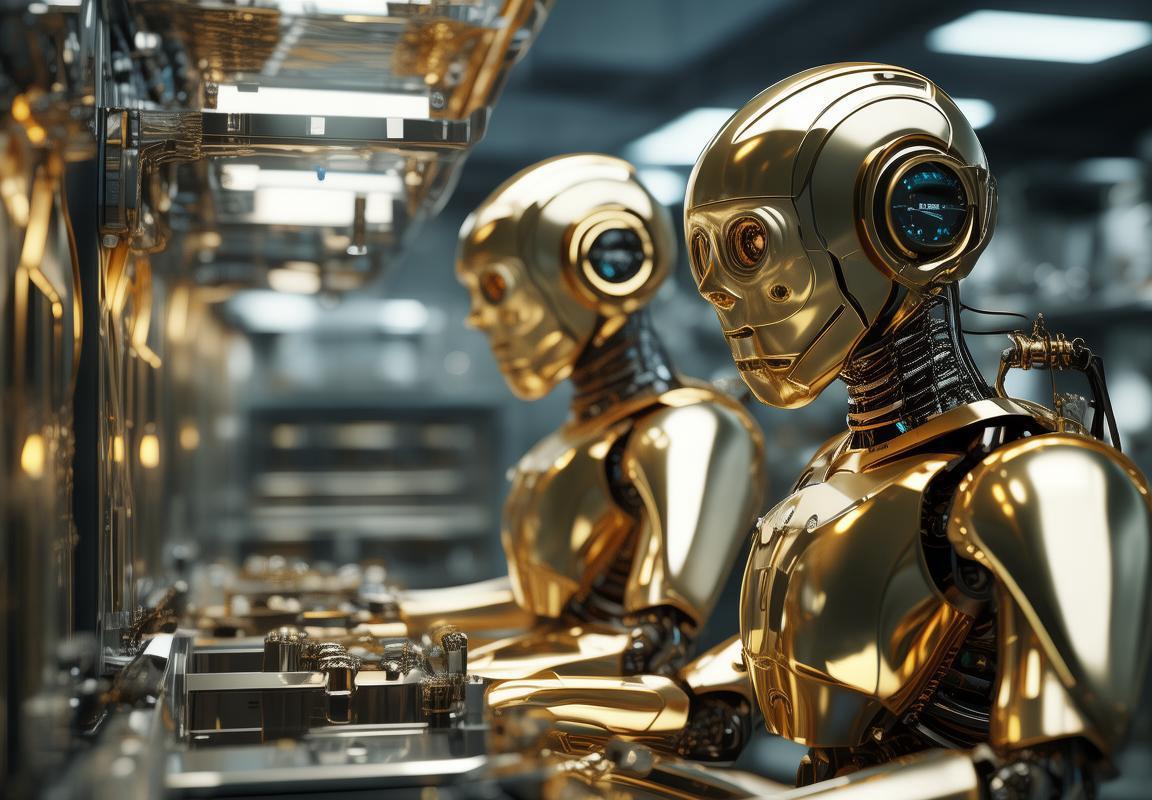
1 European Market Dynamics
The European kitchen appliance market has been witnessing a significant transformation, largely driven by the integration of AI into production quality control. This shift has not only reshaped the industry’s landscape but has also influenced consumer preferences and market strategies.
In recent years, European consumers have been increasingly seeking high-quality, energy-efficient, and smart appliances. This demand has prompted manufacturers to adopt AI-driven quality control to ensure that their products meet these stringent standards. The result is a market that is not just competitive but also technologically advanced.
One of the key impacts of AI on the European market is the enhancement of product reliability. With AI systems monitoring and analyzing production processes in real-time, defects can be identified and corrected at the earliest stage, reducing the likelihood of faulty products reaching the consumer. This has led to a rise in customer satisfaction and brand loyalty.
Moreover, AI-driven quality control has facilitated the customization of kitchen appliances. By analyzing consumer data, manufacturers can tailor their products to specific needs and preferences, which has become a crucial differentiator in a market saturated with options. For instance, AI can predict maintenance needs, ensuring that appliances are well-serviced and remain in optimal condition for longer periods.
In terms of market trends, the European Union’s stringent energy efficiency regulations have pushed manufacturers to innovate. AI plays a pivotal role in this by optimizing appliance performance, thereby meeting or exceeding energy standards. This not only benefits the environment but also positions European brands as leaders in sustainability.
The adoption of AI in quality control has also led to a more agile production process. By automating routine checks and using predictive analytics, manufacturers can quickly adapt to changes in demand and production schedules. This agility is crucial in a market where consumer trends can shift rapidly.
On the regulatory front, European countries have been at the forefront of embracing AI in manufacturing. Governments are investing in research and development, providing incentives for companies to integrate AI technologies. This supportive environment has fostered a culture of innovation, where companies are encouraged to push the boundaries of what’s possible in kitchen appliance production.
In the context of supply chains, AI has played a pivotal role in ensuring transparency and traceability. By analyzing vast amounts of data, manufacturers can monitor the integrity of their supply chain, from raw materials to finished products. This has not only improved product quality but has also bolstered brand reputation in a region where trust is highly valued.
The European kitchen appliance market has also seen a surge in the adoption of AI for predictive maintenance. By analyzing data from appliances in the field, manufacturers can predict when components are likely to fail, thus reducing downtime and the need for emergency repairs. This proactive approach to maintenance has been well-received by both consumers and businesses.
Despite these advancements, challenges remain. The initial investment in AI technologies can be substantial, and there is a need for skilled workers who can manage and maintain these systems. Additionally, data privacy concerns and the need for robust cybersecurity measures are critical issues that need to be addressed.
The European kitchen appliance market is a testament to the power of AI in transforming traditional industries. As manufacturers continue to leverage AI-driven quality control, we can expect to see further innovation and a market that is more responsive to consumer needs and sustainable practices.
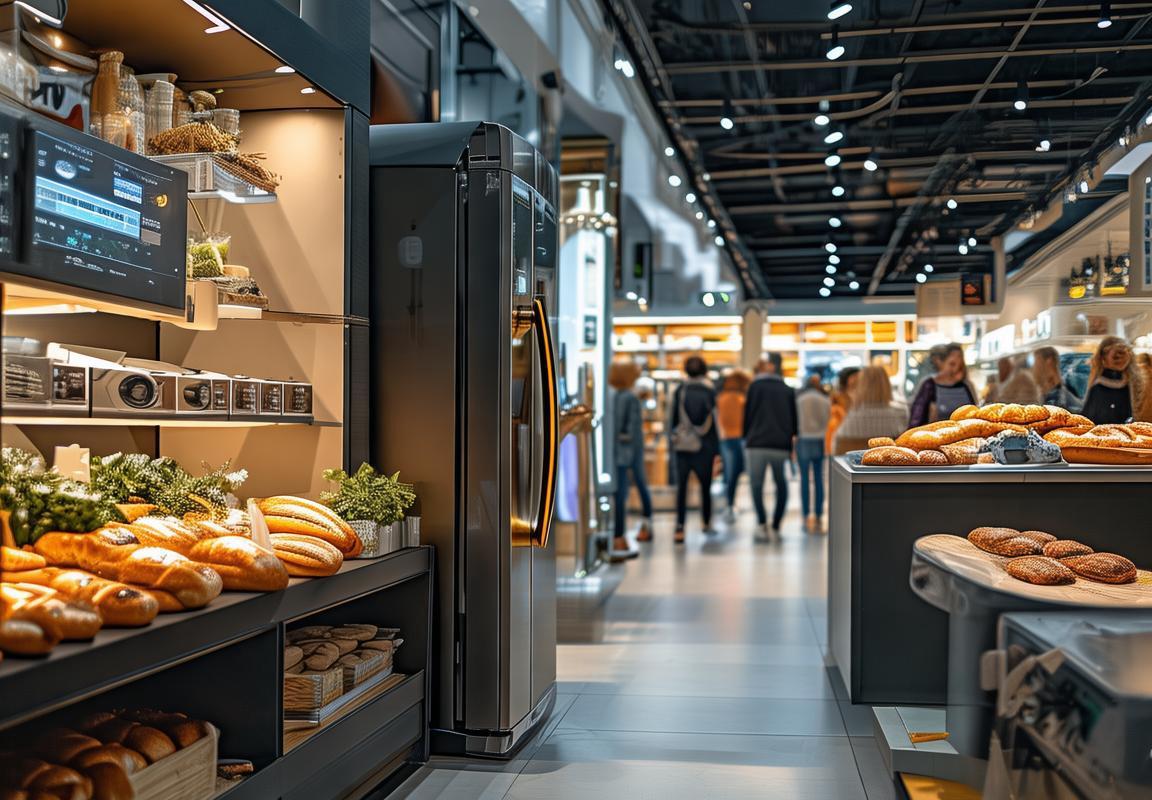
2 American Market Trends
The American kitchen appliance market has seen a remarkable transformation, with AI playing a pivotal role in shaping its dynamics. From smart appliances to predictive maintenance, the integration of AI has not only improved efficiency but also set new standards for customer expectations.
In recent years, the American market has witnessed a surge in the adoption of smart kitchen appliances. These devices are equipped with AI-driven features that allow for greater convenience and connectivity. For instance, refrigerators with AI can analyze usage patterns and suggest meal ideas, while dishwashers can optimize cycles based on load and soil levels. This shift towards smart technology has been a direct response to consumer demand for more advanced and integrated kitchen solutions.
The rise of e-commerce has also influenced the kitchen appliance market in the U.S. Online retailers have leveraged AI to enhance customer experiences, from personalized product recommendations to efficient fulfillment. AI algorithms analyze purchasing history, preferences, and market trends to suggest appliances that align with individual needs. This not only increases sales but also fosters a more engaging shopping experience.
Moreover, the American kitchen appliance market is characterized by a strong emphasis on innovation and design. Brands are continuously looking to incorporate the latest AI technologies to offer unique features that set them apart from competitors. For example, AI-driven ovens can adjust cooking temperatures and times based on the type of food and desired outcome, providing users with unparalleled precision and control.
Energy efficiency remains a key concern in the American market, and AI is playing a crucial role in addressing this issue. Smart appliances can optimize energy usage by learning the habits of their users and adjusting settings accordingly. This not only reduces utility bills but also contributes to environmental sustainability.
In terms of market trends, there’s a growing interest in sustainable and eco-friendly kitchen appliances. Consumers are increasingly aware of the environmental impact of their purchases and are actively seeking out products that align with their values. AI-driven appliances that can monitor and report on energy consumption are becoming more popular, as they provide transparency and encourage responsible usage.
The American kitchen appliance market is also witnessing a shift towards customization. AI is enabling manufacturers to offer personalized configurations, allowing customers to choose specific features and settings that cater to their unique cooking styles and preferences. This level of personalization was once only available in high-end models, but AI is making it accessible to a broader consumer base.
Another significant trend is the integration of AI in predictive maintenance. Appliances can now use AI algorithms to predict potential issues before they arise, thereby reducing downtime and costly repairs. This proactive approach to maintenance is not only beneficial for consumers but also for the manufacturers, who can improve customer satisfaction and brand loyalty.
In the realm of commercial kitchen appliances, AI is being used to optimize operations in restaurants and other food service establishments. From inventory management to energy usage, AI-driven systems are helping businesses streamline their processes and reduce costs. The ability to analyze vast amounts of data in real-time allows for more informed decision-making and improved efficiency.
Finally, the American kitchen appliance market is becoming more inclusive, with AI helping to make appliances more accessible to individuals with disabilities. Features such as voice control and automated settings are making kitchen tasks easier and safer for all users.
In summary, the American kitchen appliance market is rapidly evolving, with AI at the forefront of these changes. The integration of AI is not just about adding smart features; it’s about creating a more sustainable, efficient, and user-centric market that caters to the diverse needs of consumers. As AI technology continues to advance, it’s likely that we’ll see even more innovative applications that further disrupt and enhance the kitchen appliance landscape.
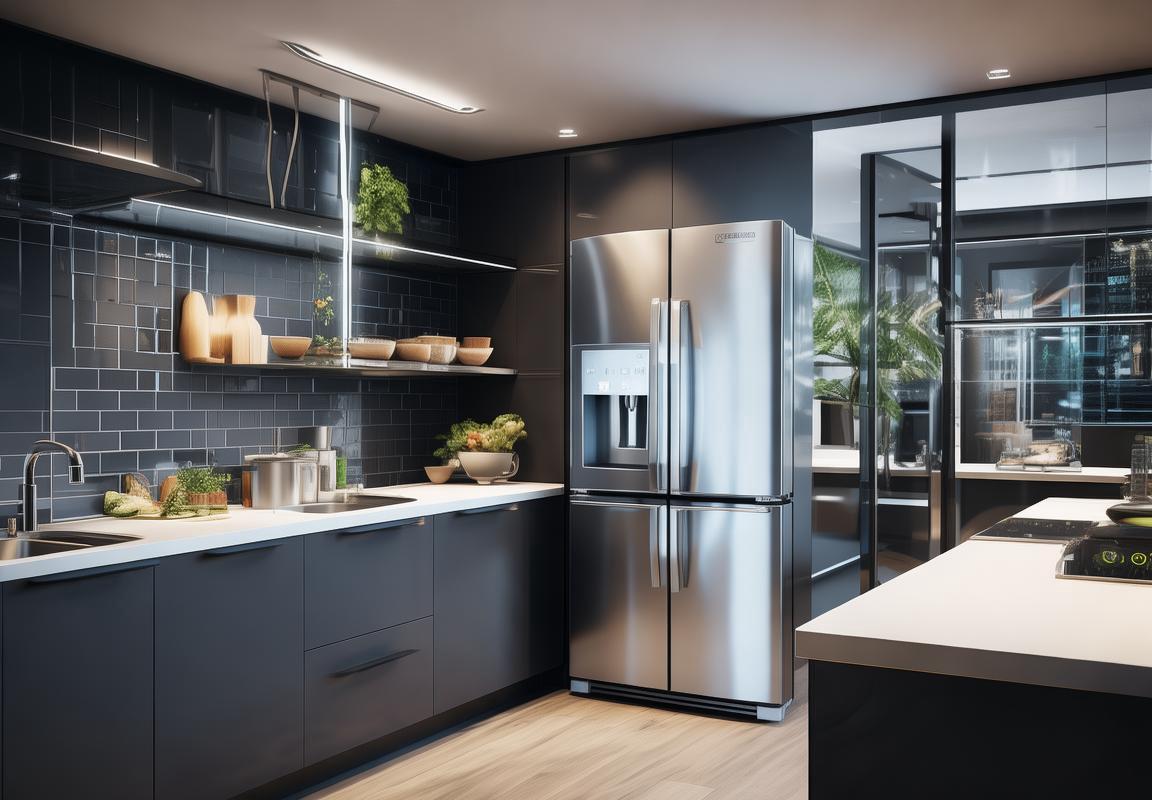
Key Benefits of AI-Driven Quality Control
In the realm of kitchen appliance manufacturing, the integration of AI-driven quality control has ushered in a new era of precision and efficiency. This transformation brings with it a suite of significant benefits that are reshaping the industry landscape. Let’s delve into the key advantages that AI-driven quality control offers.
Increased EfficiencyAutomated systems powered by AI can process vast amounts of data in real-time, significantly reducing the time it takes to inspect and verify the quality of kitchen appliances. This rapid analysis allows for quicker feedback loops, enabling manufacturers to address issues promptly and maintain a seamless production flow.
Enhanced AccuracyAI algorithms are designed to identify patterns and anomalies with a level of precision that surpasses human capabilities. This heightened accuracy in detecting defects, such as minor cracks or misalignments, ensures that only appliances meeting the highest standards reach the consumer market.
Cost ReductionWhile the initial investment in AI-driven systems can be substantial, the long-term cost savings are substantial. By reducing the number of defective products that need to be reworked or discarded, manufacturers can cut down on waste and associated costs. Additionally, AI can optimize production processes, leading to lower energy consumption and fewer material losses.
Improved ConsistencyConsistency is key in the production of kitchen appliances. AI-driven quality control ensures that each unit undergoes the same rigorous inspection, eliminating variability in the quality control process. This consistency not only improves customer satisfaction but also builds brand trust and loyalty.
Predictive MaintenanceAI can analyze data from the production line to predict potential machinery failures or issues before they occur. This predictive maintenance capability helps prevent costly downtime and ensures that the production process runs smoothly, reducing the risk of quality lapses.
Customization and PersonalizationAI-driven systems can be programmed to adapt to specific quality standards and requirements, allowing for greater customization and personalization in the manufacturing process. This is particularly important in a market where consumers are increasingly seeking unique and tailored products.
Real-Time Data AnalysisThe ability to analyze data in real-time provides manufacturers with actionable insights into their production processes. This instant feedback can lead to immediate adjustments and improvements, ensuring that quality issues are addressed as they arise.
ScalabilityAs the kitchen appliance market continues to grow, AI-driven quality control systems can easily scale to accommodate larger production volumes. This scalability is crucial for maintaining high standards as the business expands.
Regulatory ComplianceWith stringent regulatory standards in both Europe and the United States, AI-driven quality control systems can help manufacturers ensure compliance. By consistently meeting these standards, companies can avoid fines and reputational damage.
Employee Training and DevelopmentAI can assist in employee training by providing real-time feedback and insights into best practices. This not only enhances the skill set of the workforce but also fosters a culture of continuous improvement within the organization.
Environmental ImpactThe efficiency gains and waste reduction achieved through AI-driven quality control can have a positive environmental impact. By minimizing the production of defective products and optimizing resource usage, manufacturers can contribute to a more sustainable approach to kitchen appliance manufacturing.
In conclusion, the adoption of AI-driven quality control in the kitchen appliance market is not just a technological advancement; it represents a strategic move towards a more efficient, precise, and sustainable industry. These benefits underscore the importance of embracing AI in the quest to deliver the highest quality products to consumers.
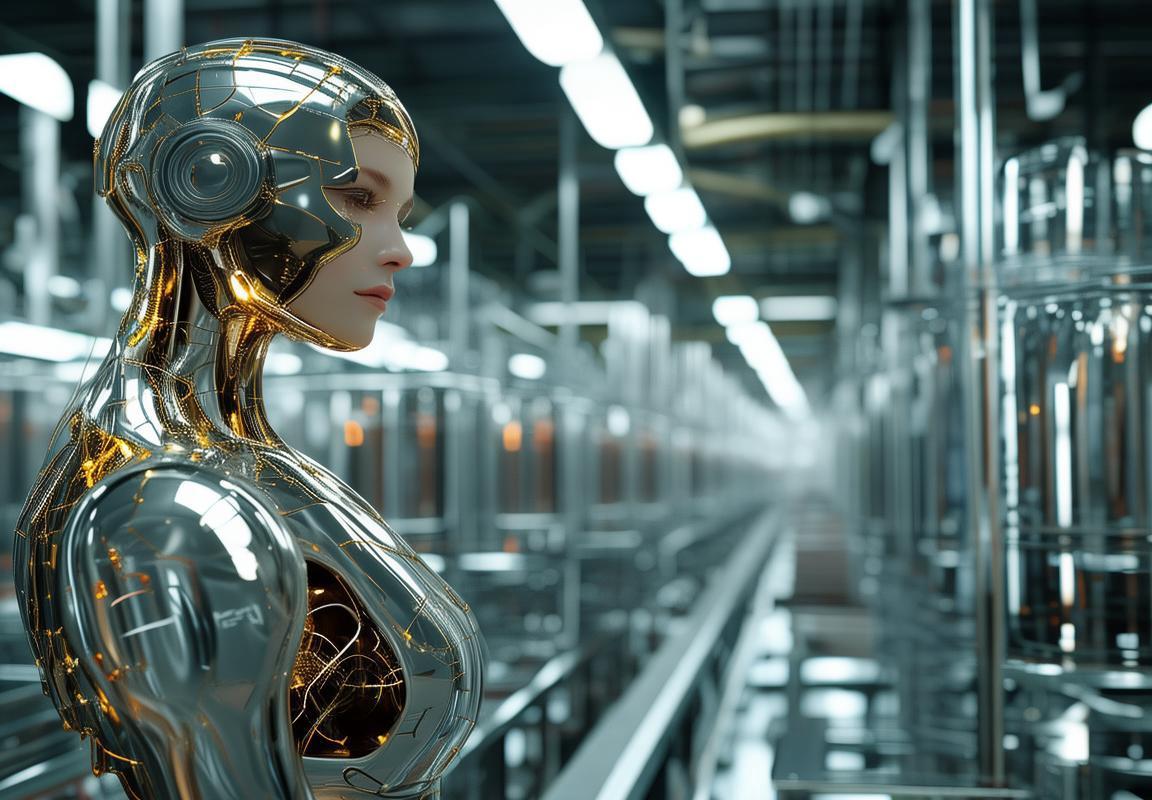
1 Improved Efficiency
In the realm of kitchen appliance manufacturing, AI-driven quality control has revolutionized the efficiency of production processes. This transformation isn’t just about cutting down on time; it’s about redefining the very essence of how products are monitored and verified. Here’s a deeper dive into the ways AI is boosting efficiency:
Streamlined InspectionsAI systems can conduct inspections at a pace that far outstrips manual processes. With high-speed cameras and advanced image recognition algorithms, these systems can scan thousands of components per hour, detecting even the most minute defects that might be overlooked by human eyes.
Predictive MaintenanceBy analyzing data from sensors embedded in appliances, AI can predict when certain parts are likely to fail. This foresight allows for maintenance to be scheduled proactively, reducing downtime and ensuring that products remain in optimal working condition for longer periods.
Automated Data AnalysisThe sheer volume of data generated during production can be overwhelming. AI algorithms can sift through this data to identify patterns and anomalies that might indicate quality issues, all without the need for extensive manual analysis.
Real-Time AdjustmentsIn the event that a defect is detected, AI-driven systems can make real-time adjustments to the production line. This immediate response can prevent a batch of defective products from being produced, saving time and resources.
Reduced WasteWith AI’s ability to detect defects early, the likelihood of producing faulty items is significantly reduced. This not only improves efficiency but also minimizes waste, a critical factor in a world where sustainability is a growing concern.
Enhanced Operator TrainingAI can also be used to train operators more effectively. By simulating various scenarios and providing immediate feedback, it ensures that workers are skilled in handling the machinery and following quality control protocols.
ScalabilityAs demand fluctuates, AI-driven quality control systems can scale up or down to meet production needs. This flexibility is invaluable in markets where supply and demand can vary widely over time.
Consistency Across VolumesWhether producing a small batch or a large one, AI ensures consistency in quality control. The same high standards are maintained regardless of volume, which is crucial for maintaining brand reputation and customer satisfaction.
Integration with Existing SystemsAI can be seamlessly integrated with existing manufacturing systems, from supply chain management to inventory control. This integration creates a more cohesive and efficient production environment.
Cost Savings Over TimeWhile the initial investment in AI-driven quality control may be significant, the long-term cost savings are substantial. Reduced waste, fewer defects, and increased productivity all contribute to a more cost-effective manufacturing process.
Market ResponsivenessThe ability to quickly identify and rectify quality issues means that companies can respond swiftly to market demands. This agility is a key competitive advantage in a rapidly evolving industry.
Data-Driven Decision MakingWith AI providing actionable insights, decision-makers can base their strategies on real-time data, leading to more informed and efficient operations.
Enhanced Customer ExperienceUltimately, the efficiency gains from AI-driven quality control translate into a better customer experience. Reliable, high-quality products lead to increased customer satisfaction and loyalty.
The efficiency improvements brought about by AI-driven quality control in the kitchen appliance industry are not just about faster production lines; they represent a shift in how quality is perceived and achieved. By leveraging the power of AI, manufacturers can not only produce better products but also do so in a more sustainable and responsive manner.
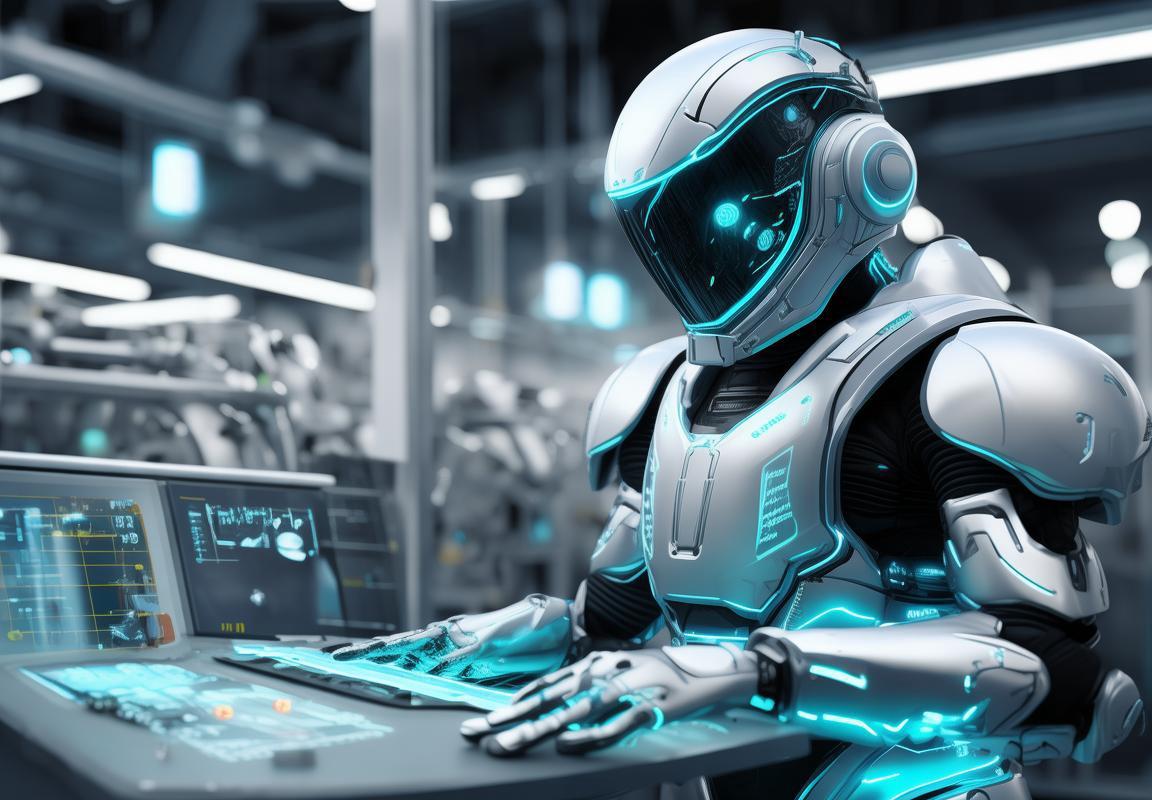
2 Enhanced Accuracy
In the realm of kitchen appliance manufacturing, the introduction of AI-driven quality control has marked a significant shift. This technology has not only revolutionized the way defects are detected but has also elevated the accuracy of quality assurance processes. Here’s how AI has been fine-tuning precision:
AI’s ability to analyze vast amounts of data at extraordinary speeds is unparalleled. By processing information faster than human inspectors, AI systems can identify even the most minute defects that might otherwise go unnoticed. This heightened sensitivity is crucial in industries where precision is paramount, such as in the production of high-end kitchen appliances.
Machine learning algorithms have been trained on countless examples of perfect and defective products. This training equips AI systems with the ability to recognize patterns and anomalies that are indicative of quality issues. Unlike human inspectors who may become fatigued or inconsistent over time, AI maintains a constant level of accuracy, ensuring that every product meets the stringent quality standards set by manufacturers.
In the context of kitchen appliances, accuracy is not just about identifying defects but also about ensuring that the functionality and safety of the products are up to par. AI-driven quality control systems can simulate the use of appliances to test their durability and reliability. This not only guarantees that the products will perform as intended but also predicts potential failures before they occur, thus preventing costly recalls and customer dissatisfaction.
The integration of AI into quality control has also led to the development of predictive maintenance. By analyzing data from sensors embedded within kitchen appliances, AI can forecast when components are likely to fail. This proactive approach allows manufacturers to replace parts before they cause any disruption, thus reducing downtime and ensuring a consistent supply of high-quality products to consumers.
Moreover, AI’s accuracy extends to the customization of quality control processes. Unlike one-size-fits-all inspection methods, AI can tailor its analysis to specific models or batches of kitchen appliances, ensuring that the unique requirements of each product are met with precision.
In the realm of safety, AI-driven quality control is a game-changer. It can detect minute changes in the structure of materials, such as thinning or warping, which could indicate a potential safety hazard. This level of detail is essential in kitchen appliances, where the risk of accidents is higher due to the presence of sharp edges, high temperatures, and electrical components.
The accuracy of AI in quality control also translates into cost savings. By reducing the number of defective products that make it to the market, manufacturers can minimize warranty claims and customer returns. This not only improves the company’s bottom line but also enhances its reputation for producing reliable and high-quality products.
In conclusion, the enhanced accuracy brought about by AI-driven quality control is a cornerstone of the modern kitchen appliance industry. It ensures that every product that leaves the factory floor meets the highest standards of quality and safety, providing peace of mind to consumers and maintaining the integrity of the brand.
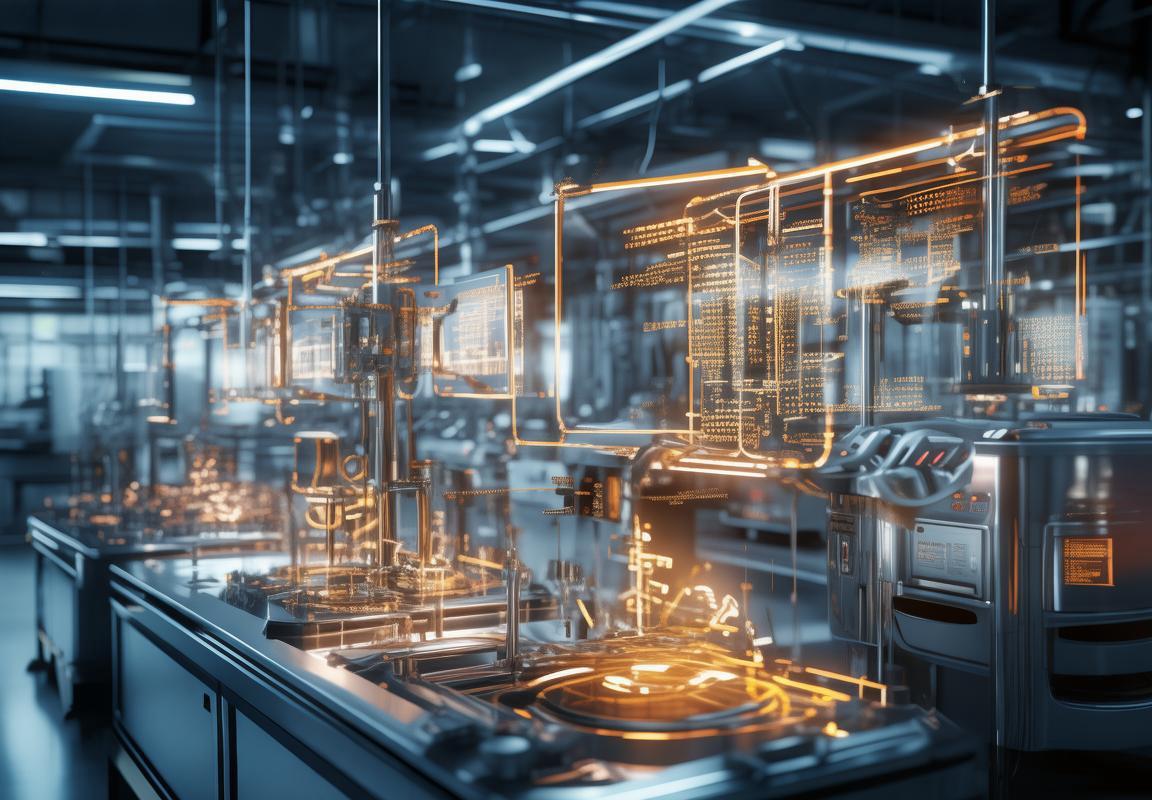
3 Cost Reduction
In the realm of kitchen appliance manufacturing, the advent of AI-driven quality control has introduced a revolutionary approach to cost reduction. This transformation isn’t just about cutting corners; it’s about optimizing the production process to achieve greater efficiency and precision. Here’s how AI is making this possible:
Manufacturers are no longer burdened with the need for extensive manual labor to inspect each unit, a process that is time-consuming and error-prone. AI systems, equipped with advanced algorithms, can analyze and evaluate products at a pace that far surpasses human capabilities. This rapid assessment means that defects can be caught early in the production line, preventing costly rework or recalls later on.
The elimination of manual checks also means a reduction in the number of workers required to perform these tasks. By automating quality control, companies can decrease their workforce in this area, which in turn reduces labor costs. This shift doesn’t just apply to the production floor; it extends to the administrative side as well, where AI can streamline processes and cut down on the need for additional staff to manage quality control documentation.
AI-driven systems are not just efficient; they are precise. Traditional quality control methods often rely on human judgment, which can be subjective and inconsistent. AI, on the other hand, operates on a set of predefined parameters that ensure every product is evaluated using the same criteria. This consistency means that defects are identified and addressed uniformly, which is crucial for maintaining brand reputation and customer satisfaction.
The predictive capabilities of AI also play a significant role in cost reduction. By analyzing data from previous production runs, AI can predict potential issues before they arise. This proactive approach allows manufacturers to address these issues early, preventing the production of defective products and the subsequent costs associated with fixing or recalling them.
Another aspect of AI-driven quality control that contributes to cost reduction is the reduction in waste. Defective products often end up in landfills or require extensive reprocessing, both of which are costly. With AI’s ability to detect defects at a granular level, manufacturers can minimize waste by discarding only the parts that are truly defective, rather than an entire batch.
Furthermore, AI can help in optimizing the supply chain. By providing real-time data on production performance and quality, manufacturers can make informed decisions about inventory levels, raw material sourcing, and production schedules. This optimization reduces the costs associated with overstocking or stockouts, as well as the costs of transporting and storing excess materials.
The integration of AI into quality control also has a long-term impact on the cost structure of a company. As AI systems become more sophisticated, they can adapt and improve over time, requiring less human intervention and fewer adjustments to the production process. This means that the initial investment in AI technology can lead to substantial savings in the long run, as the system becomes more efficient and effective.
In conclusion, the adoption of AI-driven quality control in kitchen appliance manufacturing is not just about reducing costs; it’s about creating a sustainable and scalable solution that enhances the overall performance of the production line. By leveraging the power of AI, manufacturers can achieve higher quality standards, lower production costs, and a more resilient supply chain, all while maintaining the competitive edge in a rapidly evolving market.
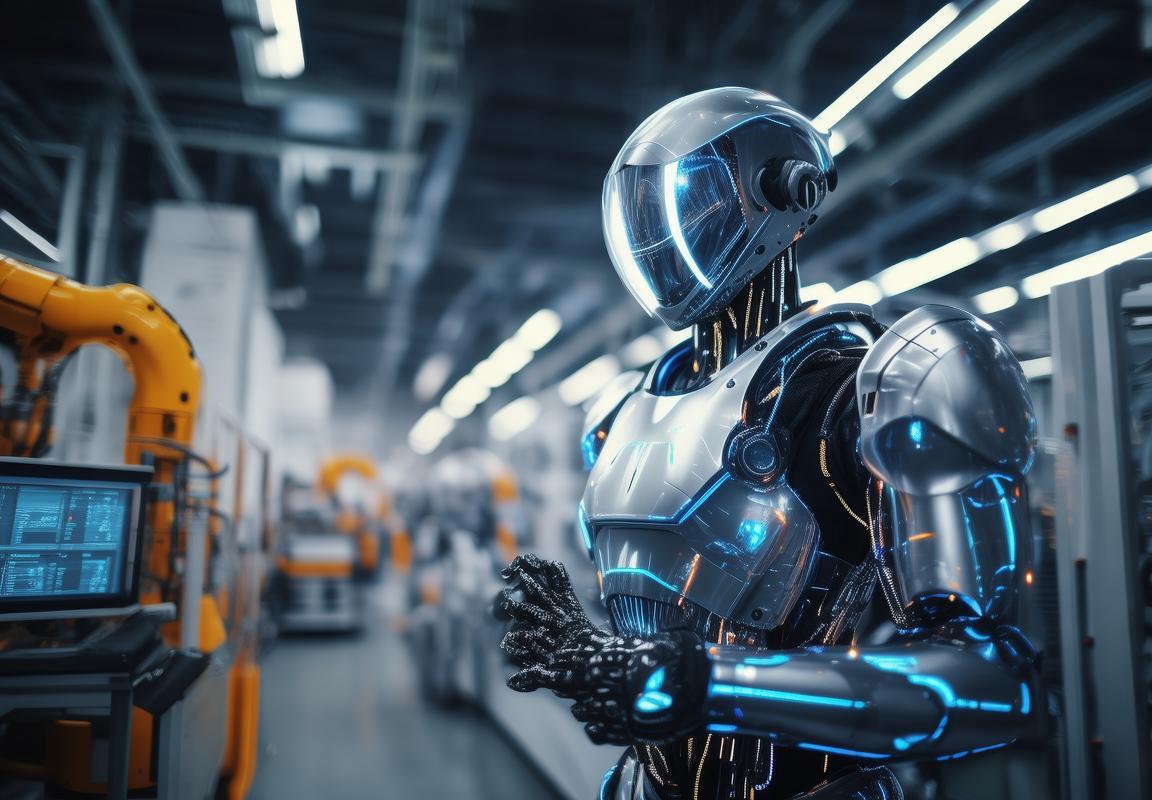
Challenges and Considerations
In the realm of kitchen appliance manufacturing, embracing AI-driven quality control has introduced a new era of precision and efficiency. However, this transition is not without its set of challenges and considerations that must be carefully navigated.
The reliance on AI for quality control in kitchen appliances has brought about a significant shift in the industry. This shift is marked by a more streamlined process, where machines can perform tasks with a level of consistency and speed that was once unattainable by human labor. This newfound efficiency has several layers, each contributing to the overall improvement in the production process.
For instance, AI systems can analyze data in real-time, identifying patterns and anomalies that might indicate potential issues before they escalate. This proactive approach allows manufacturers to address problems swiftly, reducing the likelihood of defective products reaching the market. The speed at which AI can process information and respond is unparalleled, making it an invaluable asset in maintaining high production standards.
Moreover, AI-driven quality control systems can operate 24⁄7 without the need for breaks or rest, ensuring that the production line runs smoothly without interruption. This constant operation not only increases output but also minimizes downtime, a significant factor in cost-effectiveness and customer satisfaction.
The accuracy of AI in quality control is another critical aspect that cannot be overstated. In the past, human inspectors were prone to fatigue, which could lead to oversight and misjudgment. AI, on the other hand, operates with a level of precision that is consistent and unyielding. It can inspect every aspect of a kitchen appliance, from the smallest component to the largest assembly, with the same degree of care and attention.
This level of accuracy is achieved through the use of advanced algorithms that have been trained on vast datasets. These algorithms can recognize defects that are imperceptible to the human eye, such as minor dents or misalignments, which could compromise the functionality or safety of the appliance. By catching these issues early, manufacturers can prevent costly recalls and maintain their brand reputation.
In terms of cost reduction, AI-driven quality control offers substantial benefits. The traditional approach to quality control, which often involved a large workforce dedicated to inspecting each product, was not only time-consuming but also expensive. AI systems can significantly reduce labor costs by automating these tasks, allowing manufacturers to allocate their resources more effectively.
Furthermore, the reduction in defective products due to enhanced accuracy means fewer resources are wasted on repairs or replacements. This not only saves on the direct costs associated with fixing defects but also on the indirect costs, such as customer satisfaction and brand loyalty. The long-term savings can be substantial, especially for large-scale manufacturers.
However, the integration of AI into quality control also brings about challenges and considerations that must be addressed. One of the most significant concerns is data security and privacy. As AI systems require vast amounts of data to function effectively, there is a risk that sensitive information could be compromised. Manufacturers must ensure that robust data protection measures are in place to safeguard customer data and comply with regulations.
Another challenge is the potential for skill gaps in the workforce. As AI systems become more prevalent, there may be a need for a new skill set among employees. Manufacturers will need to invest in training programs to ensure that their workforce is equipped to work alongside AI systems, understanding both their capabilities and limitations.
Additionally, the cultural shift brought about by AI in the workplace cannot be overlooked. Employees may resist the introduction of AI, fearing job displacement. It is crucial for manufacturers to communicate the benefits of AI-driven quality control and to involve employees in the transition process, fostering a culture of acceptance and collaboration.
Lastly, the ethical implications of AI in quality control must be carefully considered. Manufacturers must ensure that AI systems are designed and operated in a way that prioritizes safety, fairness, and transparency. This includes addressing biases in AI algorithms and ensuring that the decisions made by these systems align with ethical standards.
In conclusion, while AI-driven quality control offers significant benefits in terms of efficiency, accuracy, and cost reduction, it also presents challenges that require thoughtful consideration. By addressing these challenges and embracing the opportunities that AI brings, the kitchen appliance industry can continue to evolve and lead the way in technological innovation.

1 Data Security and Privacy
In the realm of AI-driven production quality control, data security and privacy stand as paramount concerns. The digital transformation of the kitchen appliance industry has ushered in a deluge of data, which, while valuable, also presents significant risks. Here’s an exploration of the intricacies surrounding data security and privacy challenges in this context:
As appliances become smarter and more connected, the amount of data they generate grows exponentially. This wealth of information includes personal user data, manufacturing details, and even real-time usage patterns. Such extensive data collection demands robust security measures to prevent unauthorized access and potential misuse.
The European Union’s General Data Protection Regulation (GDPR) sets stringent standards for data protection, affecting companies worldwide that handle European customers’ data. Compliance with GDPR means that kitchen appliance manufacturers must ensure that sensitive information is processed lawfully, transparently, and securely. Failure to meet these requirements can lead to substantial fines and reputational damage.
One of the primary challenges in data security is the complexity of protecting data across various stages of its lifecycle. From initial collection to storage, processing, and disposal, each step requires careful consideration and implementation of security protocols. The interconnected nature of modern appliances, which are often part of the Internet of Things (IoT), multiplies these challenges, as data flows between devices, cloud servers, and third-party applications.
The use of advanced algorithms and machine learning in AI-driven quality control introduces additional layers of complexity. These systems require large datasets to learn and optimize their performance, which can come from a variety of sources, including consumer usage patterns and sensor data. Ensuring that this data is anonymized and aggregated appropriately is crucial to maintain privacy while still allowing for effective analysis.
Cybersecurity threats are ever-evolving, and the kitchen appliance industry is not immune. Hackers may target smart appliances to gain access to personal information or to disrupt their functionality. The interconnected nature of these devices means that a single vulnerability can potentially impact a large user base, making the need for robust security measures even more critical.
Moreover, the reliance on cloud services for data storage and processing adds another layer of concern. While cloud providers offer extensive security measures, the shared infrastructure means that a single breach can have far-reaching consequences. Kitchen appliance manufacturers must balance the benefits of cloud computing with the risks it presents to data security and privacy.
In addition to external threats, there are also internal risks. Employees who have access to sensitive data must be trained to recognize potential security threats and to follow best practices for data handling. The human element is often the weakest link in cybersecurity, and ensuring that all personnel are aware of their responsibilities is essential.
The importance of data privacy extends beyond compliance with regulations. Consumers are increasingly concerned about how their data is used and shared. Trust is a crucial factor in the kitchen appliance market, and manufacturers must be transparent about their data practices to maintain customer loyalty.
As the industry evolves, new technologies and methodologies are being developed to address data security and privacy challenges. This includes the use of blockchain for enhanced data transparency and integrity, as well as advanced encryption techniques to safeguard sensitive information.
In conclusion, the intersection of AI-driven production quality control and data security is a complex landscape. Kitchen appliance manufacturers must navigate a myriad of challenges, from adhering to regulatory requirements to protecting against cyber threats and ensuring that customer privacy is respected. The path forward involves a combination of technological innovation, robust security protocols, and a commitment to ethical data practices.

2 Skill Gaps in the Workforce
In the rapidly evolving landscape of kitchen appliance manufacturing, the integration of AI into quality control has introduced a new set of challenges. One of the most pressing concerns is the potential for skill gaps within the workforce. These gaps can arise from a variety of factors, including the shift in job requirements, the need for new technical skills, and the pace at which technology is advancing.
The traditional roles of quality inspectors, for instance, are being redefined by AI. While AI systems can now detect minute defects with remarkable precision, the human element is still crucial. Workers need to understand how to interpret the data generated by AI, how to calibrate and maintain these systems, and how to work alongside them effectively. This requires a different skill set than the one that was sufficient in the past.
One significant gap is the lack of AI literacy among the workforce. Many employees may not be familiar with the basics of artificial intelligence, machine learning, or data analysis. This can hinder their ability to collaborate with AI systems or even to understand the reports and analytics they produce. Training programs and workshops are essential to bridge this knowledge gap, ensuring that employees can engage with AI-driven quality control systems confidently.
Moreover, the introduction of AI into quality control has raised the bar for technical skills. Workers now need to be adept at using specialized software and hardware, which can be complex and require a steep learning curve. This is particularly challenging for companies with a large, diverse workforce, where training every employee to the same level of proficiency is not always feasible.
The pace of technological advancement also poses a challenge. New AI tools and methodologies are being developed at a rapid pace, and keeping up with these changes is a daunting task. Workforces need to be dynamic and adaptable, capable of learning new skills and integrating them into their daily routines. This requires a culture of continuous learning and professional development, which may not be present in all organizations.
Another aspect of the skill gap is the potential for job displacement. As AI takes over tasks that were once performed by humans, there is a concern that some jobs will become obsolete. This can lead to a loss of employment and economic hardship for affected workers. Companies must address this by offering retraining programs and exploring new roles that combine human creativity and AI capabilities.
Furthermore, the management of AI systems requires a different set of skills. Leaders need to understand the potential and limitations of AI, as well as how to integrate it into their business strategies. This includes decision-making about which tasks to automate, how to balance human and AI roles, and how to ensure ethical and responsible use of AI.
The skill gap in the workforce is also evident in the area of cybersecurity. As AI systems become more interconnected, the risk of cyber threats increases. Workers need to be aware of the importance of data security and privacy, and they must understand how to protect sensitive information from unauthorized access. This requires a comprehensive understanding of cybersecurity principles and practices.
In conclusion, the integration of AI into production quality control in the kitchen appliance industry has brought about significant changes. These changes have highlighted the need for a workforce that is not only technically skilled but also adaptable, capable of continuous learning, and aware of the ethical considerations surrounding AI. Addressing these skill gaps will be crucial for the success and sustainability of companies in this sector.
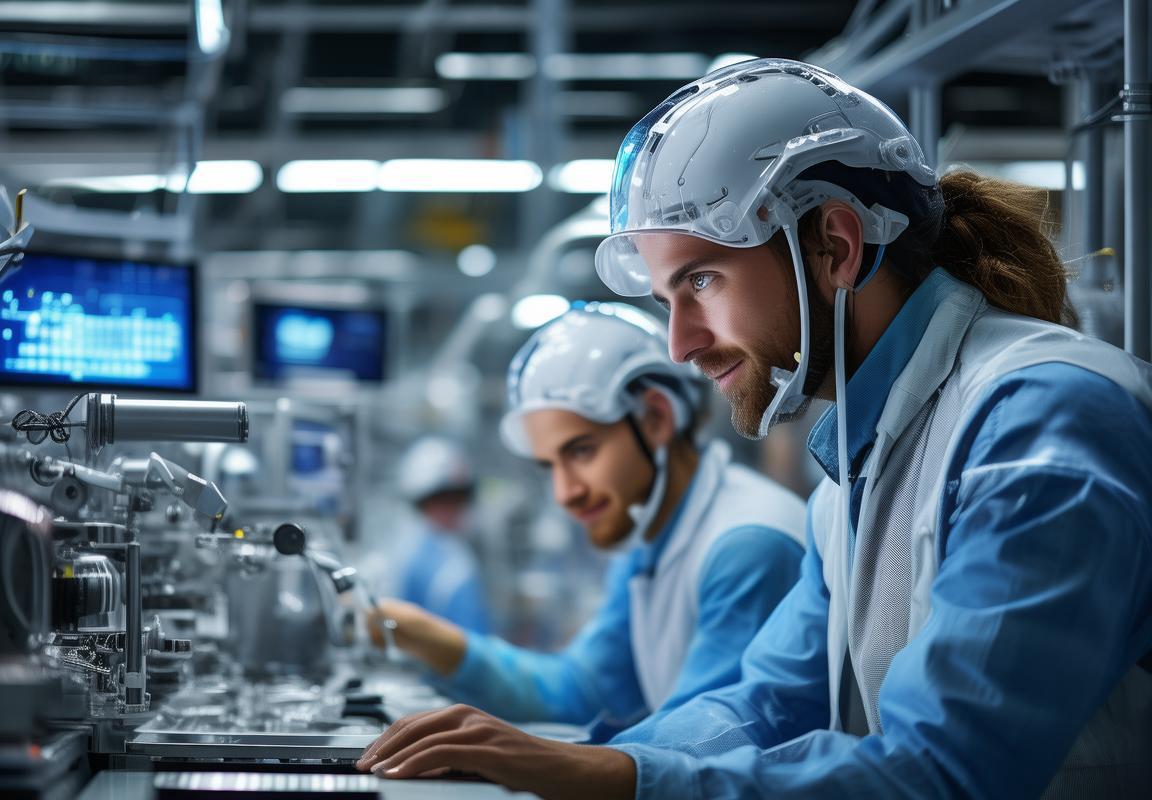
Future Outlook and Predictions
In the evolving landscape of kitchen appliance manufacturing, the future holds a myriad of possibilities shaped by the integration of AI and other advanced technologies. As we look ahead, several trends and predictions emerge, painting a picture of a market that is both dynamic and innovative.
Technological Integration DeepensThe future of kitchen appliance production will see a deeper integration of AI and IoT (Internet of Things) technologies. Appliances will not only be smart but also interconnected, forming a network that allows for predictive maintenance, real-time data analysis, and seamless user experiences.
Customization Becomes the NormWith AI’s ability to analyze consumer data and preferences, we can expect a shift towards highly customized kitchen appliances. Manufacturers will be able to tailor products to individual needs, offering features and functionalities that resonate with specific user demographics.
Energy Efficiency and Sustainability Take Center StageAs environmental concerns grow, energy-efficient and sustainable kitchen appliances will become more prevalent. AI will play a crucial role in optimizing energy use, reducing waste, and promoting eco-friendly practices throughout the production process.
Global Collaboration and Supply Chain OptimizationThe kitchen appliance industry will likely see increased collaboration across borders, with manufacturers leveraging global supply chains to source materials and components. AI-driven supply chain management will ensure efficiency and responsiveness, minimizing delays and costs.
Rise of the Smart KitchenThe smart kitchen is not just a trend; it’s becoming a reality. AI will enable appliances to communicate with each other and with homeowners, creating an ecosystem where the kitchen is not just a place for cooking but a hub for health, wellness, and convenience.
Artificial Intelligence as a Core CompetencyAs AI becomes more integral to the manufacturing process, companies will need to invest heavily in AI research and development. Those that fail to adapt may find themselves at a competitive disadvantage.
Consumer Trust and Ethical ConsiderationsWith the increasing reliance on AI, consumer trust will be paramount. Companies will need to ensure transparency in their AI systems, addressing ethical concerns and ensuring that their products respect user privacy and data security.
Regulatory Compliance and StandardizationAs AI becomes more widespread, regulatory bodies may establish standards for its use in kitchen appliances. This could lead to a standardized approach to AI implementation, ensuring safety and uniformity across the industry.
Human-AI CollaborationThe future will see a blend of human ingenuity and AI precision. While AI can handle repetitive tasks and complex data analysis, human creativity and problem-solving skills will remain invaluable in designing and improving kitchen appliances.
Emergence of New Business ModelsThe integration of AI into kitchen appliances could lead to new business models, such as subscription-based services for ongoing maintenance and updates. This could shift the focus from selling a single product to offering a continuous service experience.
Global Market ExpansionAs technology advances, the global market for kitchen appliances will expand. Emerging markets will see increased adoption of smart kitchen appliances, driven by rising incomes and a growing awareness of the benefits of advanced technology.
Innovation in Materials and DesignThe future of kitchen appliances will also see innovation in materials and design, with a focus on durability, aesthetics, and user-friendliness. AI will play a role in optimizing these aspects, ensuring that appliances are not only functional but also visually appealing and easy to use.
The future of the kitchen appliance industry is bright and filled with potential. With AI at the forefront, we can anticipate a market that is more efficient, personalized, and sustainable, meeting the evolving needs of consumers worldwide.
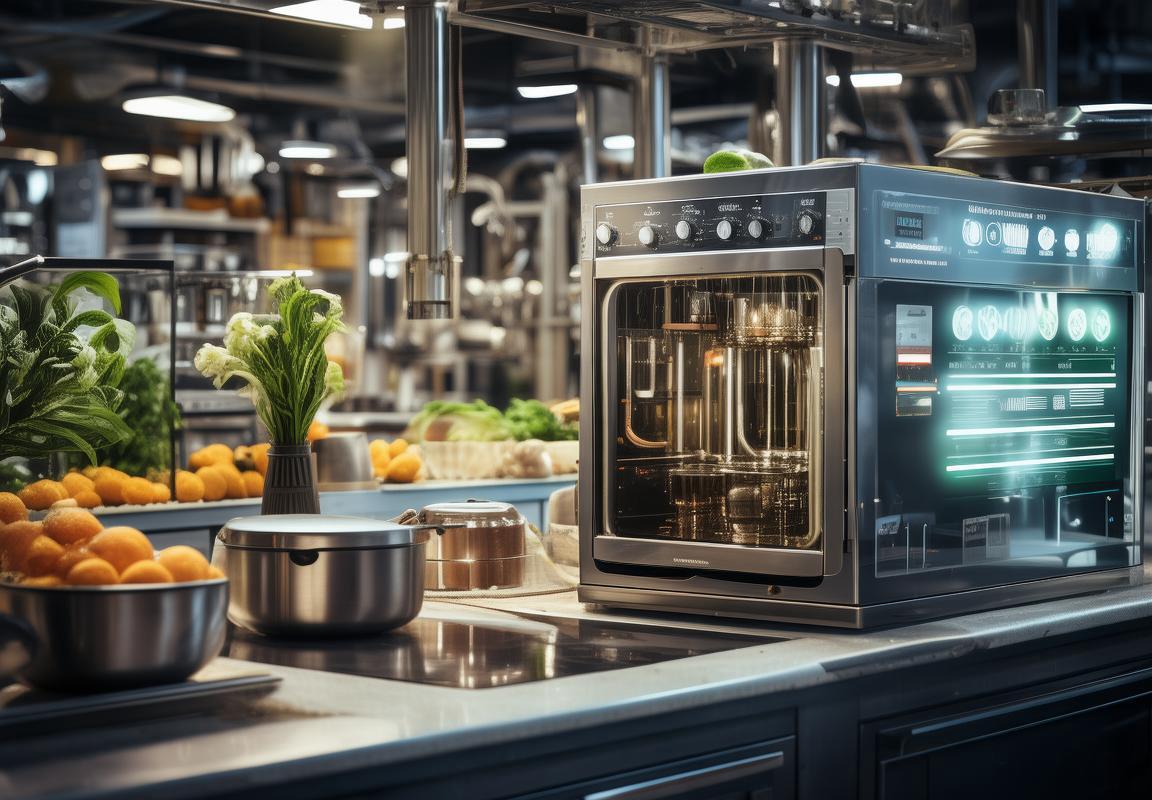
1 Predictions for AI in Kitchen Appliance Quality Control
The integration of AI into kitchen appliance quality control is poised to revolutionize the industry, with several predictions shaping the future landscape. As technology advances, we can anticipate several key developments:
-
Predictive Maintenance: AI systems are expected to evolve to the point where they can predict potential malfunctions before they occur. By analyzing data from sensors embedded in appliances, AI algorithms can foresee when components might fail, allowing for preemptive maintenance and reducing downtime.
-
Real-Time Quality Monitoring: AI-driven systems will likely become more sophisticated, enabling real-time monitoring of production lines. This would mean that any deviation from the desired quality standards can be detected and addressed instantaneously, ensuring that only top-quality products leave the factory.
-
Customization and Personalization: With AI’s ability to process vast amounts of data, kitchen appliances could become more tailored to individual user needs. AI could analyze usage patterns and suggest settings or features that optimize performance and energy efficiency for each user.
-
Increased Use of IoT: The rise of the Internet of Things (IoT) will further enhance AI’s role in quality control. Appliances will be able to communicate with each other and with the user, providing feedback and insights that can be used to improve the overall quality of the product lifecycle.
-
Enhanced User Experience: AI-driven quality control will likely lead to appliances that are not only more reliable but also easier to use. By learning from user interactions, appliances can adapt their interfaces and functionalities to better suit the preferences and habits of their owners.
-
Global Standardization: As AI becomes more prevalent, there may be a push towards global standards for AI-driven quality control in kitchen appliances. This could streamline the certification process and ensure that products meet the same high standards across different markets.
-
Ethical and Legal Frameworks: The increasing reliance on AI in quality control will necessitate the development of ethical and legal frameworks to govern its use. This includes considerations around data privacy, algorithmic bias, and the rights of consumers.
-
Sustainability Focus: AI’s predictive capabilities can also be harnessed to improve the sustainability of kitchen appliances. By optimizing energy use and predicting wear and tear, appliances can be designed to be more environmentally friendly and have a longer lifespan.
-
Cross-Industry Collaboration: The kitchen appliance industry may see more collaboration with other sectors that have already embraced AI, such as automotive and aerospace. This cross-pollination of ideas could lead to innovative solutions that were not previously considered.
-
Continuous Learning and Adaptation: AI systems will become more adept at learning from their environment and adapting to new challenges. This means that as the industry evolves, AI-driven quality control systems will continuously improve, becoming more robust and reliable over time.
These predictions reflect a future where AI is not just a tool for quality control but a cornerstone of innovation in the kitchen appliance industry. As AI continues to advance, it’s clear that the role it plays in ensuring the highest standards of quality will only grow more significant.
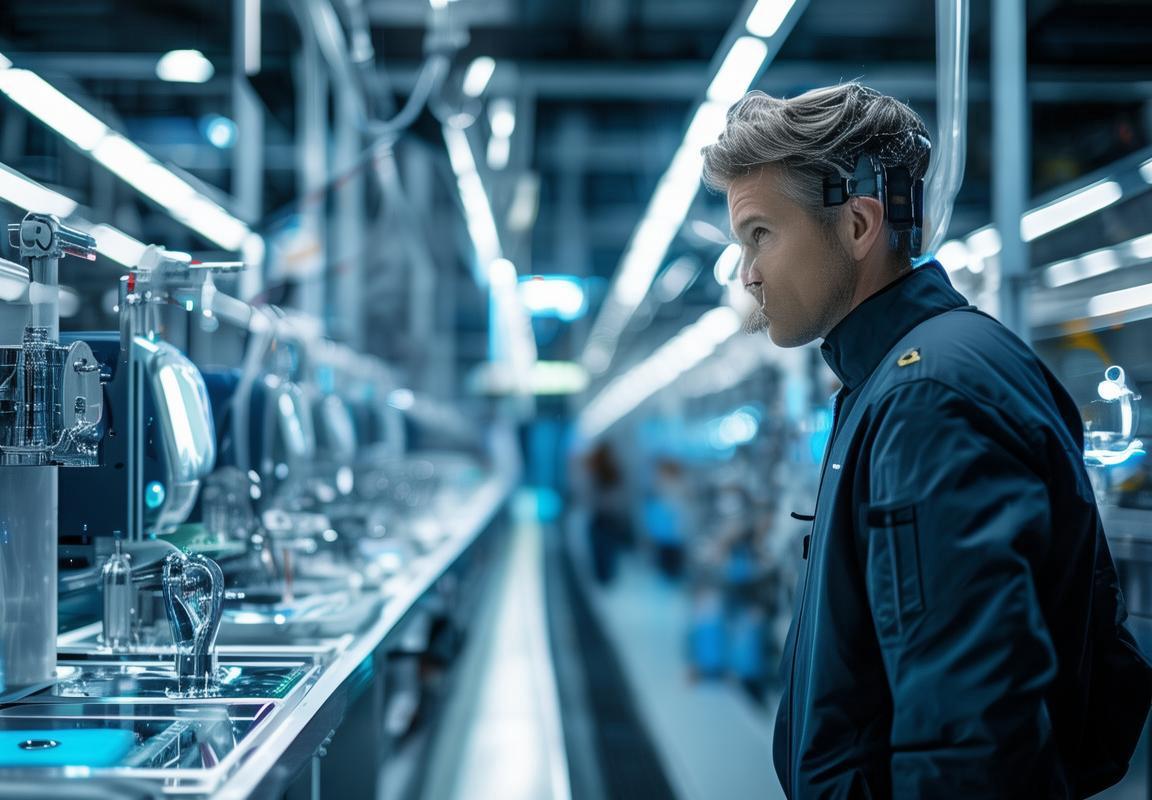
2 The Role of AI in Global Market Competitiveness
In the rapidly evolving landscape of the kitchen appliance industry, the integration of AI has become a pivotal factor in shaping global market competitiveness. AI’s role in enhancing product quality, optimizing supply chains, and personalizing customer experiences has positioned companies at the forefront of innovation. Let’s delve into how AI is set to influence the competitive edge of kitchen appliance manufacturers on a global scale.
The AI-driven customization of kitchen appliances is transforming the market, allowing manufacturers to cater to the specific needs and preferences of consumers worldwide. By analyzing vast amounts of data, AI algorithms can predict trends and adapt product designs accordingly. This not only ensures that products resonate with local markets but also enables companies to stay ahead of the curve in a highly competitive environment.
As the global kitchen appliance market becomes more diverse, AI’s ability to manage complex supply chains becomes increasingly crucial. By optimizing logistics and inventory management, AI helps reduce costs and lead times, ensuring that products are delivered efficiently to customers across different regions. This efficiency is a key differentiator in a market where time-to-market is a significant competitive advantage.
The rise of smart kitchen appliances has also brought about a new wave of data collection and analysis. AI’s role in processing this data is pivotal, as it can extract valuable insights that inform product development, marketing strategies, and customer service. This data-driven approach allows manufacturers to anticipate market needs and tailor their offerings to meet them, thereby gaining a competitive edge.
Innovation in technology often leads to a shift in consumer behavior. AI is facilitating this shift by enabling appliances that are not only more efficient but also more intuitive to use. From voice-controlled ovens to smart refrigerators that can suggest recipes based on available ingredients, AI is creating new categories of kitchen appliances that appeal to tech-savvy consumers. This tech-driven consumer appeal can set manufacturers apart in a crowded market.
Globalization has led to a more interconnected world, where local regulations and cultural nuances can significantly impact market success. AI’s ability to adapt to these diverse environments is a game-changer. By learning from a variety of global markets, AI can help manufacturers navigate complex regulatory landscapes and create products that resonate with local tastes and norms.
Moreover, AI’s role in predictive maintenance and troubleshooting is reducing downtime for kitchen appliances, thus extending their lifespan and customer satisfaction. In a market where the cost of downtime can be substantial, this capability is a crucial competitive advantage.
The environmental impact of kitchen appliances is also a growing concern for consumers and regulators alike. AI can help manufacturers design more sustainable products by optimizing energy use and materials. This not only aligns with global sustainability goals but also allows companies to position themselves as eco-friendly, which can be a strong selling point in environmentally conscious markets.
In the realm of service and support, AI-powered chatbots and virtual assistants are revolutionizing customer interactions. By providing instant, personalized support, these AI tools are enhancing customer satisfaction and loyalty. In a market where customer service is a key differentiator, AI is a powerful tool for maintaining a competitive edge.
The rise of e-commerce has expanded the global reach of kitchen appliance manufacturers. AI’s role in personalizing online shopping experiences can significantly impact sales. By understanding consumer behavior and preferences, AI can recommend products and streamline the shopping process, leading to higher conversion rates and increased sales.
Lastly, the global kitchen appliance market is witnessing a surge in cross-border collaboration and partnerships. AI is facilitating these collaborations by enabling real-time data sharing and analysis, which accelerates innovation and allows companies to tap into new markets more effectively.
In conclusion, AI’s role in global market competitiveness in the kitchen appliance industry is multifaceted. From enhancing product quality and supply chain efficiency to personalizing customer experiences and addressing environmental concerns, AI is a cornerstone of modern manufacturing. As the industry continues to evolve, those who harness the power of AI effectively will undoubtedly gain a significant competitive advantage.